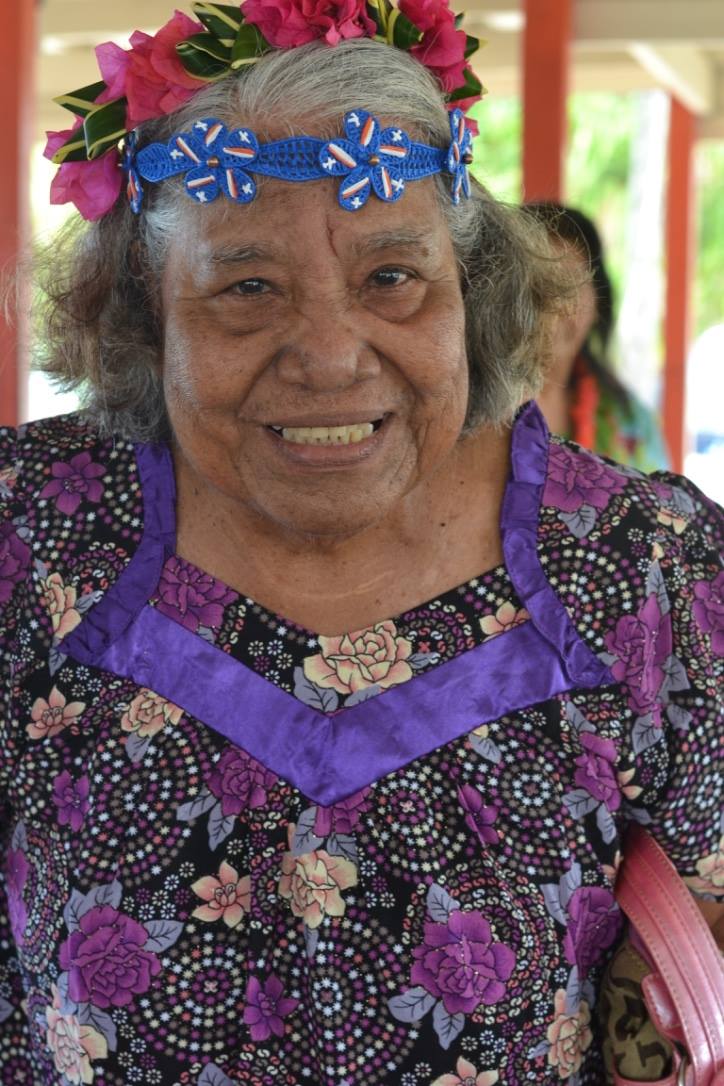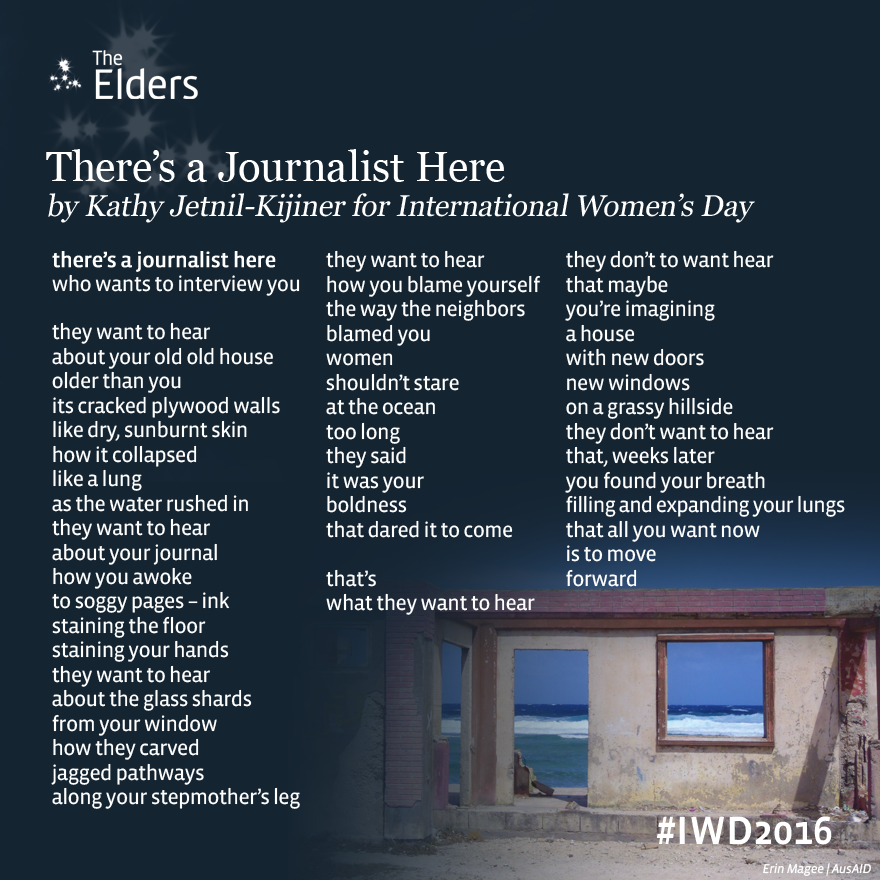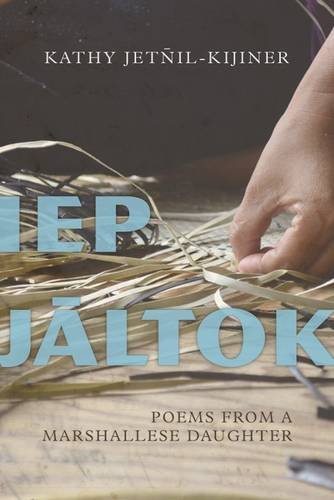*originally published on The Elders website to coincide with a blog post by Mary Robinson, former Ireland president and climate activist, for International Women’s Day.
Here in the Marshall Islands, International Women’s Day immediately follows a national holiday. On March 1, Nuclear Victims Remembrance Day commemorates the legacy of US nuclear testing on our islands. As these two events collide, I find myself wrestling with connections between gender, international power, nuclear legacies, climate change, and lost land.
From 1946 to 1968, 67 nuclear weapons were detonated, which is the equivalent of 1.7 Hiroshima bombs being exploded daily for 12 years in terms of radiation exposure. Just the Bravo shot alone, a 15-megaton hydrogen bomb, was 1,000 times more powerful than the atomic bomb that was dropped on Hiroshima.
Women disproportionally bear the burden of the trauma their society has been exposed to – in this case, they bear the burden of a nuclear legacy. It was women who found themselves with birth defects after exposure to the radiation and fallout. “Jellyfish babies” is what they call them. Tiny beings with no bones.
Limeyo Abon is a Marshallese elder and nuclear survivor who spoke at the ceremony this past Tuesday. She was only 14 years old when the Bravo shot was detonated.

The fallout from the Bravo shot rained on her home island of Rongelap. She thought it was snow. In her speech, she stated that the only thing she’ll be able to pass on to her children is sickness and a rootless existence. Since the day radiated ash fell on her island, she has been exiled from her island.
I have been passionately advocating against climate change because of my deep sense of fear that our islands will one day be wiped off the map, due to the rising sea levels. But I never realized that we, some of us more than others, have already known the pain of lost homelands. Three islands have been literally vaporized because of the power of the bombs. Bikini and Rongelap atoll are forever lost to our people because of high levels of radiation. This is a loss we’ve had to bear “for a greater good” – a reasoning that is very similar to those who are convinced that our need for consumption outweighs the livelihoods of others.
This is all the more devastating when you consider the impacts that loss of land could have on women’s already struggling statuses here in the Marshalls. Our culture is among the few around the world that is still matrilineal. Our mothers bestow land rights and chiefly titles. We believe that it is through our mothers that we receive power.
But what will happen to that power if there is no land to pass down?
In regards to the possible loss of our islands, I’ve asked myself many times – what will happen to our culture? It is only today that I ask – what will happen to our women?
As a November 2015 report from U.N. Women read, “No policy response to climate change is gender neutral.” This makes me think of two women.
The first is a woman I met while running errands. She was fundraising with her sisters by the side of the road, selling plates of barbeque chicken for two dollars. The funds go towards their family’s sea wall – a wall that most Marshallese people have along the lagoon and ocean side to prevent the tide from destroying their house. Their sea wall had been destroyed during the last flooding from high tides. It wasn’t her husband who organized, cooked, packed, and stood by the side of the road for hours selling those plates – it was her and her sisters.
The second is my cousin. I’ve just received a text message from her inviting me over to a house warming ceremony tomorrow. The construction of her family’s new house is finally done. Her old home, the one she’d lived in all her life with her family, was also destroyed during the last king tides. Her family has spent the past two years moving from place to place, taking out loans, and navigating new sources of family tension. This tension would, more often than not, explode onto my cousin. As the eldest daughter, she bears the burden of responsibility.
In both cases, it was the women rebuilding a new life. And so it would be with our work in climate change. The policies from the Paris agreement will not be successful without proper engagement of women – without structures set in place specifically to support women. But what does this look like? I’m not sure. I only know that it’s a path we need to begin walking down – the sooner the better. Our women lived and survived through the nuclear testing, and we will weather the storms of climate change as well, if given the proper support.
I’d like to close with a poem I wrote about my cousin after she lost her home. It celebrates her resilience – a viewpoint rarely seen when discussing monumental issues such as these.
As we’ve seen with the horrific experience of jelly babies, sometimes, women give birth to the traumas they’ve experienced. And sometimes, if given support (and even sometimes without it) they give birth to a new life, to fresh possibilities. For this International Women’s Day, I celebrate the resilience and strength of our Marshallese women.
There’s a Journalist Here
there’s a journalist here
who wants to interview you
they want to hear
about your old old house
older than you
its cracked plywood walls
like dry, sunburnt skin
how it collapsed
like a lung
as the water rushed in
they want to hear
about your journal
how you awoke
to soggy pages – ink
staining the floor
staining your hands
they want to hear
about the glass shards
from your window
how they carved
jagged pathways
along your stepmother’s leg
they want to hear
how you blame yourself
the way the neighbors
blamed you
women
shouldn’t stare
at the ocean
too long
they said
it was your
boldness
that dared it to come
that’s
what they want to hear
they don’t to hear
that maybe
you’re imaging
a house
with new doors
new windows
on a grassy hillside
they don’t want to hear
that, weeks later
you found your breath
filling and expanding your lungs
that all you want now
is to move
forward


I admire your dedication to education, remembering and helping the Marshallese, as well as the world. We’re all in this together, even those who deny climate change and inter-connection. blessings, Brad